Violent anti-LGBT protesters arrested in clash with police at Kyiv Pride
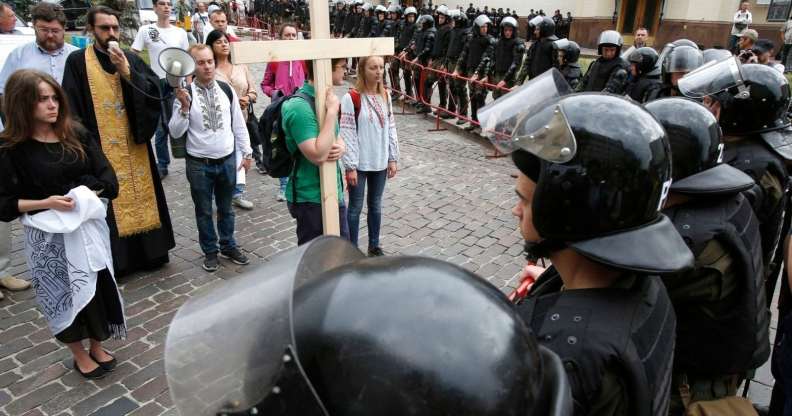
A protester holds a wooden cross during a protest against Kyiv Pride. Ukrainian police detained 56 far-right activists who tried to interrupt the Pride march (ANATOLII STEPANOV/AFP/Getty)
Ukrainian police detained 56 members of far-right ultra-nationalist groups who were attempting to disrupt Kyiv’s Pride march.
The Ukrainian capital’s Pride event has been marred by violence towards LGBT activists repeatedly over the past decade, but thanks to a heavy police presence the march went ahead without incident in 2016 and 2017.
This year’s Pride march on Sunday (June 18) also went ahead with minimal disruption, despite clashes between violent far-right activists and police.
The march attracted more than 5,000 LGBT activists, who braved threats of violence from nationalists to turn up and celebrate LGBT equality.
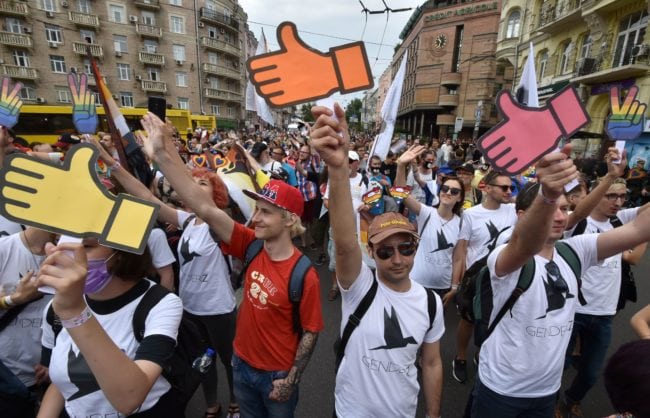
Participants wave banners and flags as they attend Kyiv Pride (GENYA SAVILOV/AFP/Getty)
The only hitch came when a group of 150 far-right protesters, including members of alleged ‘neo-Nazi’ group C14, attempted to block the parade route.
However, the city’s police forces quickly surrounded the anti-LGBT protesters and managed to restrain them after violent altercations.
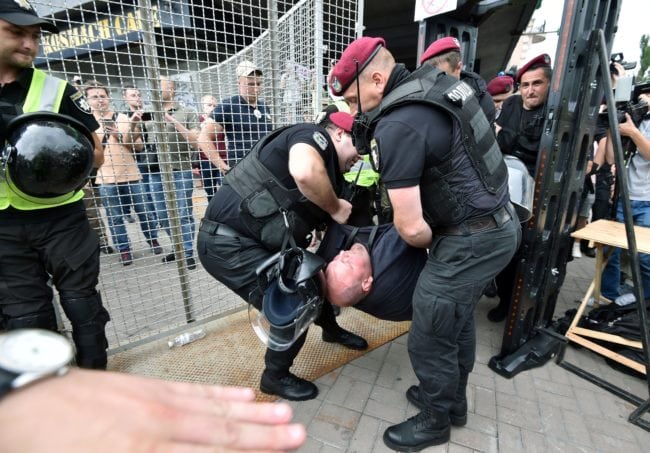
Policemen detain an anti-LGBT activist at Kyiv Pride (GENYA SAVILOV/AFP/Getty)
According to AFP, five police officers were injured in the clash with the far-right activists, and Reuters reports that 56 people were detained at the event.
Police confirmed: “Several men who resisted and used gas canisters against law enforcement officers were detained.”
Kyiv Pride organisers say that 2,500 police officers were provided to secure the march.
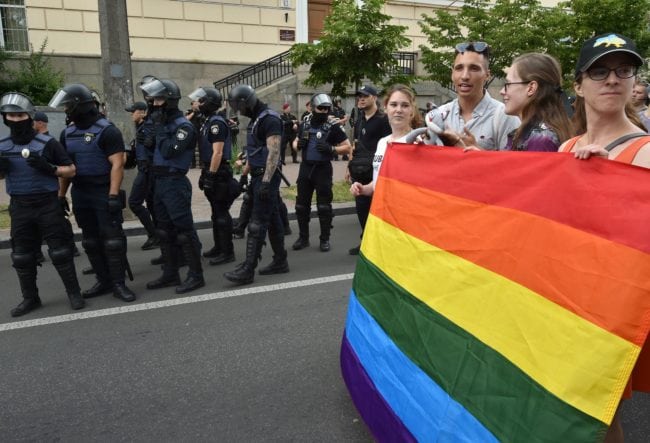
Policemen escort participants as they take part in Kyiv Pride (GENYA SAVILOV/AFP/Getty)
The event was joined by several Ukrainian MPs, including lana Zalishchuk, Serhiy Leshchenko and Oleksiy Mushak, as well as overseas politicians including ambassadors and German government minister Michael Roth.
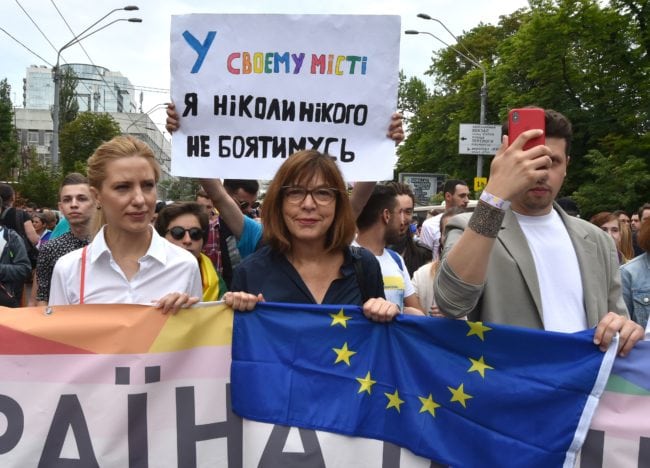
Member of the European Parliament Rebecca Harms (C) takes part in the Pride march in central Kyiv on June 17, 2018. (GENYA SAVILOV/AFP/Getty)
LGBT rights have come to the fore in Ukraine as the country seeks closer ties with the European Union in the wake of its 2014 revolution.
It has largely liberalised on the issue, ending years of state-sanctioned violence and oppression towards the Pride march, though any concrete reform on equal rights remains a distant possibility.
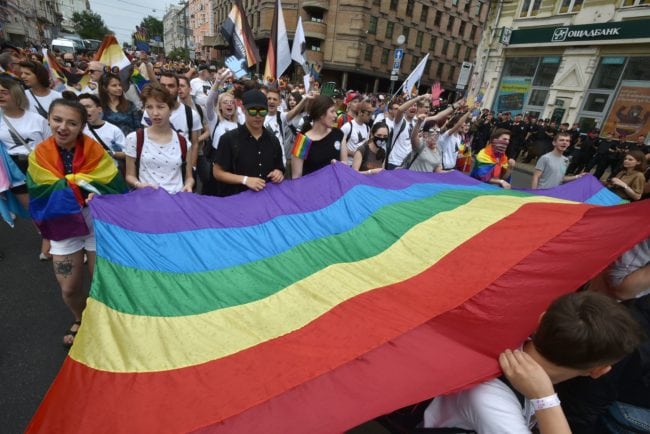
Participants attend a pride march in central Kyiv on June 17, 2018. (GENYA SAVILOV/AFP/Getty)
There has also been a rise in far-right nationalism and anti-LGBT sentiment in the country, with a surge in reported attacks targeted at LGBT events and other minority groups.
Amnesty said in a report last month that this year “there have been at least 30 attacks by members of far-right groups on women rights defenders, LGBTI and left-wing activists and Roma families.”
It adds: “In most cases, the perpetrators act openly and with near-total impunity, often boasting about the incidents on social media.
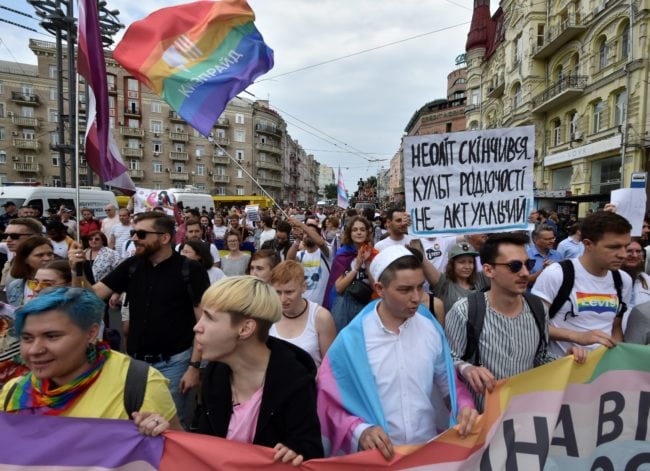
Participants march behind a banner as they take part in Kyiv Pride (GENYA SAVILOV/AFP/Getty)
“In just one case, an attack on the Festival of Equality in the city of Zaporizhzhya in September 2017, the perpetrators were arrested and put on trial.”
Just last month a meeting for the LGBT community in Kyiv was disrupted by far-right protesters. The militant nationalists threatened the participants with violence in order to force the cancellation of the event.
Last year, Kyiv’s Friendship of Nations Arch, which was originally dedicated to the unification of Ukraine and Russia within the Soviet Union, was partly repainted in rainbow colours to “celebrate diversity.”
However, the top of the monument was left unpainted after protests from anti-LGBT groups who claimed it was “perverted symbolism.”
Following the protests the remainder of the painting was called off, and Mayor Klitschko declared that as part of a “compromise” the unpainted part of the arch would remain rainbow-free.

